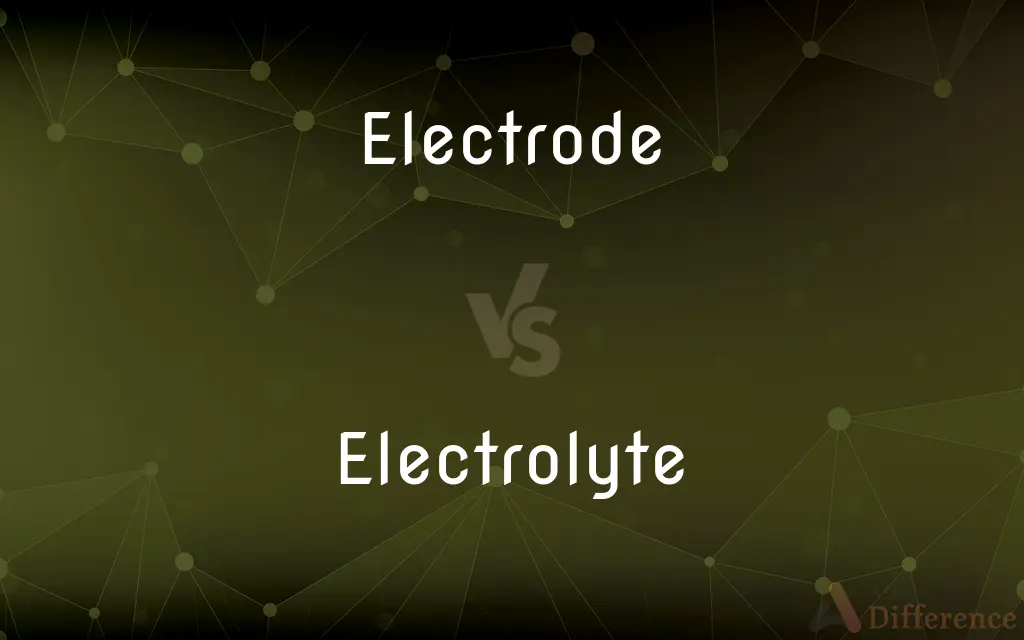Electrode vs. Electrolyte — What's the Difference?
Edited by Tayyaba Rehman — By Fiza Rafique — Updated on March 10, 2024
Electrodes are conductive materials allowing electric current flow, whereas electrolytes are substances that produce ions in solution, enabling conductivity.

Difference Between Electrode and Electrolyte
Table of Contents
ADVERTISEMENT
Key Differences
Electrodes are crucial in creating a pathway for electric current to enter or leave a medium, such as in batteries or electrolysis processes. They come in various forms, including metals and graphite, and are categorized as anodes or cathodes based on their role in the electric circuit. Electrolytes, on the other hand, are chemicals that dissociate into ions when dissolved in a solvent like water. This ionization makes the solution conductive, allowing it to complete an electric circuit.
Electrodes function by transferring electrons to and from the electrolyte, thus facilitating redox reactions. Anodes undergo oxidation (lose electrons), while cathodes undergo reduction (gain electrons). Electrolytes react with electrodes but in a different manner. They produce ions that move towards the electrodes, with cations (positive ions) moving towards the cathode and anions (negative ions) moving towards the anode.
Electrodes are often chosen based on their conductivity, stability, and electrochemical properties, which are crucial for the efficiency and longevity of the device they are used in. Materials like platinum and graphite are common choices due to their high conductivity and resistance to corrosion.
Electrolytes need to have high ionic conductivity and stability to be effective. In batteries, for instance, the choice of electrolyte can significantly affect the battery's capacity, life, and safety. Aqueous electrolytes are common, but solid and gel electrolytes are also used in specific applications.
Comparison Chart
Nature
Conductive material (solid)
Ion-producing substance (liquid, gel, or solid)
ADVERTISEMENT
Role
Facilitates electron transfer
Enables ionic conductivity
Types
Anode, Cathode
Salts, Acids, Bases
Function
Participates in redox reactions
Dissociates into ions
Usage
Batteries, Electrolysis
Batteries, Biological systems
Compare with Definitions
Electrode
An electrode is a conductive material that allows the flow of electric current.
In a battery, the electrode facilitates the movement of electrons through an external circuit.
Electrolyte
An electrolyte is a substance that produces ions in solution, enabling conductivity.
Sodium chloride (table salt) becomes an electrolyte when dissolved in water.
Electrode
Electrodes are categorized as anodes or cathodes based on their function in a circuit.
In electrolysis, the anode is the electrode where oxidation occurs.
Electrolyte
Electrolytes dissociate into cations and anions in a solvent.
Acetic acid in vinegar partially dissociates into acetate ions and hydrogen ions in water.
Electrode
Electrodes are involved in redox reactions, facilitating electron transfer.
The cathode in a lithium-ion battery gains electrons during the charging process.
Electrolyte
Electrolytes conduct electricity by moving ions, essential for the operation of batteries.
The electrolyte in a car battery allows for the flow of ions between the electrodes.
Electrode
Electrodes are made from various materials, including metals and carbon.
Graphite electrodes are commonly used in electrochemical cells for their conductivity and stability.
Electrolyte
Electrolytes are crucial for various biological functions, including nerve impulse transmission.
Potassium ions are vital electrolytes for heart and muscle function in the human body.
Electrode
Electrodes are essential components of electrochemical cells.
In a fuel cell, electrodes facilitate the conversion of chemical energy into electrical energy.
Electrolyte
Electrolytes include salts, acids, and bases, depending on their chemical properties.
Hydrochloric acid (HCl) acts as a strong electrolyte in aqueous solutions.
Electrode
An electrode is an electrical conductor used to make contact with a nonmetallic part of a circuit (e.g. a semiconductor, an electrolyte, a vacuum or air).
Electrolyte
An electrolyte is a substance that produces an electrically conducting solution when dissolved in a polar solvent, such as water. The dissolved electrolyte separates into cations and anions, which disperse uniformly through the solvent.
Electrode
A solid electric conductor through which an electric current enters or leaves an electrolytic cell or other medium.
Electrolyte
A chemical compound that ionizes when dissolved or incorporated in another substance, thereby producing an electrically conductive medium.
Electrode
A collector or emitter of electric charge or of electric-charge carriers, as in a semiconducting device.
Electrolyte
A solution in which such compounds are ionized.
Electrode
The terminal through which electric current passes between metallic and nonmetallic parts of an electric circuit.
Electrolyte
(Physiology) Any of various ions, such as sodium, potassium, or chloride, required by cells to regulate the electric charge and flow of water molecules across the cell membrane.
Electrode
A collector or emitter of electric charge in a semiconducting device.
Electrolyte
(chemistry) A substance that, in solution or when molten, ionizes and conducts electricity.
Electrode
A conducting object by which electricity is conveyed into or from a solution or other non-metallic conducting medium; esp., the ends of the wires or conductors, leading from source of electricity, and terminating in the medium traversed by the current.
Electrolyte
(chemistry) A solution containing such substances, which therefore also conducts electricity.
Some modern lead-acid batteries are sealed because they never need to have any electrolyte added during their service life.
Electrode
A conductor used to make electrical contact with some part of a circuit
Electrolyte
Any of the various ions in such a solution, or (metonymically) their concentration therein.
Electrolyte
A compound decomposable, or subjected to decomposition, by an electric current.
Electrolyte
A solution that conducts electricity;
The proper amount and distribution of electrolytes in the body is essential for health
Common Curiosities
How do electrolytes conduct electricity?
Electrolytes conduct electricity by dissociating into ions that move freely in the solution.
Can electrolytes be solids?
Yes, electrolytes can be liquids, gels, or solids, as long as they can produce ions for conductivity.
What are electrodes made of?
Electrodes are made from conductive materials like metals and graphite.
What role do electrodes play in electrolysis?
Electrodes facilitate the movement of electrons in and out of the solution, driving the chemical reactions in electrolysis.
Can any metal be used as an electrode?
While many metals can serve as electrodes, the choice depends on the specific application and desired electrochemical properties.
Are all salts good electrolytes?
Most salts are good electrolytes when dissolved in water, but their effectiveness can vary based on their dissociation ability.
Why are electrolytes important in batteries?
Electrolytes allow for the movement of ions between electrodes, facilitating the flow of electric current in batteries.
Why is electrolyte balance important for athletes?
Maintaining electrolyte balance is crucial for athletes to prevent dehydration, muscle cramps, and fatigue during physical activity.
What's the difference between an anode and a cathode?
An anode is the electrode where oxidation occurs, losing electrons, whereas a cathode is where reduction occurs, gaining electrons.
How do electrolytes affect the human body?
Electrolytes regulate nerve and muscle function, hydrate the body, balance blood acidity and pressure, and help rebuild damaged tissue.
How do electrodes deteriorate?
Electrodes can deteriorate due to corrosion, material degradation, or buildup of reaction products, affecting performance.
Can electrolytes be used in energy storage systems other than batteries?
Yes, electrolytes are also used in supercapacitors and fuel cells for energy storage and conversion.
What is a common electrolyte in biological systems?
Sodium, potassium, and chloride are common electrolytes in biological systems, crucial for cellular functions.
What determines the choice of electrolyte in a battery?
Factors include ionic conductivity, chemical stability, compatibility with electrodes, and operational temperature range.
How do solid electrolytes work?
Solid electrolytes conduct ions through a solid matrix, offering advantages in stability and safety over liquid counterparts.
Share Your Discovery

Previous Comparison
Coding vs. Programming
Next Comparison
Chin vs. ChainAuthor Spotlight
Written by
Fiza RafiqueFiza Rafique is a skilled content writer at AskDifference.com, where she meticulously refines and enhances written pieces. Drawing from her vast editorial expertise, Fiza ensures clarity, accuracy, and precision in every article. Passionate about language, she continually seeks to elevate the quality of content for readers worldwide.
Edited by
Tayyaba RehmanTayyaba Rehman is a distinguished writer, currently serving as a primary contributor to askdifference.com. As a researcher in semantics and etymology, Tayyaba's passion for the complexity of languages and their distinctions has found a perfect home on the platform. Tayyaba delves into the intricacies of language, distinguishing between commonly confused words and phrases, thereby providing clarity for readers worldwide.














































